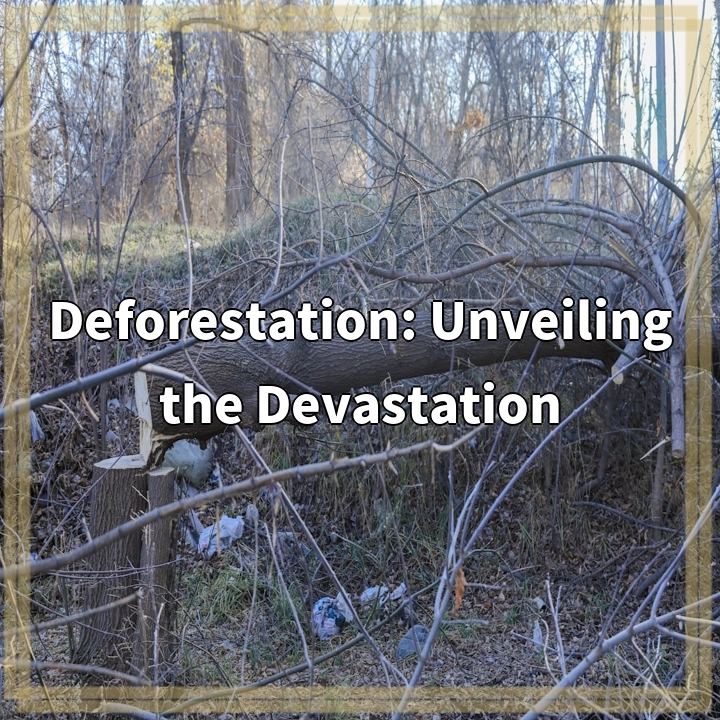Physical Address
304 North Cardinal St.
Dorchester Center, MA 02124
Physical Address
304 North Cardinal St.
Dorchester Center, MA 02124

Deforestation refers to the deliberate and widespread removal of trees from forests, converting forest areas into non-forest lands. This process involves clear-cutting or logging forests for purposes like agriculture, urbanization, logging, and mining. Deforestation is a significant environmental issue with far-reaching consequences for ecosystems, climate, and communities worldwide.
One of the major concerns with deforestation is the loss of biodiversity. Forests are home to millions of unique plant, animal, and insect species that play critical roles within their ecosystems. As trees are cut down, the habitats of these creatures are destroyed, leading to a decline in populations and, in some cases, extinction. This loss of biodiversity disrupts the delicate balance of ecosystems and can have cascading effects on other species and the environment as a whole.
Forests act as crucial carbon sinks, absorbing and storing large amounts of carbon dioxide (CO2) from the atmosphere. When trees are cleared, this carbon storage capacity is reduced, and the carbon stored in the biomass is released back into the atmosphere as CO2 through burning or decomposition. This contributes to the greenhouse effect and exacerbates climate change. Deforestation is responsible for a significant portion of global greenhouse gas emissions, making it a primary driver of climate change.
Many communities around the world depend on forests for their livelihoods. Indigenous peoples, in particular, have deep connections with forest ecosystems and rely on them for food, medicine, shelter, and cultural practices. Deforestation often leads to the displacement of communities and the loss of their traditional ways of life. It can result in the loss of income and resources, creating socio-economic challenges for affected communities.
Trees play a crucial role in maintaining soil stability by preventing erosion caused by wind and water. When forests are cleared, the exposed soil becomes vulnerable to erosion, leading to increased sedimentation in water bodies, reduced soil fertility, and land degradation. Deforestation also disrupts natural water cycles, leading to changes in local hydrological patterns and a higher risk of flooding, especially in areas with steep slopes.
Indigenous peoples and local communities possess valuable traditional knowledge and practices developed over generations. This knowledge often includes sustainable forest management techniques, medicinal plant uses, and conservation methods. Deforestation threatens the preservation and transmission of these cultural practices, eroding valuable knowledge systems that have the potential to contribute to sustainable development and environmental stewardship.
While deforestation may bring short-term economic benefits, such as timber extraction or expansion of agricultural land, the long-term economic impacts can be devastating. Forests provide essential ecosystem services, such as water purification, soil protection, and climate regulation, which are often undervalued or overlooked. The destruction of these services can have significant economic consequences, including reduced agricultural productivity, increased healthcare costs, and decreased resilience to natural disasters.
Addressing deforestation requires a range of approaches and collaborative efforts at various levels. Here are some potential solutions to combat deforestation and its associated problems:
Promote and implement sustainable land management practices, such as agroforestry and responsible logging techniques, that minimize the negative impacts on forests and biodiversity. Encourage farmers and landowners to adopt sustainable agriculture methods that prioritize conservation and protect forested areas.
Increase efforts to protect and conserve existing forests through the establishment and management of protected areas, national parks, and wildlife reserves. Enhance monitoring and enforcement measures to prevent illegal logging, encroachment, and land conversion.
Enact and enforce policies and regulations that promote sustainable forest management and address the drivers of deforestation, such as unsustainable agricultural practices, infrastructure development, and trade in illegal timber. Encourage the integration of environmental considerations into land-use planning and decision-making processes.
Recognize and respect the rights of local and indigenous communities who have sustainable traditional practices and knowledge of forest management. Involve them in decision-making processes, empower them with land tenure rights, and support community-led forest conservation initiatives.
Invest in reforestation and afforestation projects to restore degraded areas and establish new forests. Support initiatives that involve local communities, employ native tree species, and focus on ecosystem restoration to enhance biodiversity and carbon sequestration.
Educate and raise awareness among the public, policymakers, and businesses about the social, ecological, and economic value of forests. Advocate for sustainable practices, responsible consumption, and the integration of forest conservation into climate change mitigation and adaptation strategies.
Addressing deforestation requires a multifaceted and collaborative approach. By implementing sustainable land use practices, strengthening forest conservation efforts, developing effective policies, supporting local communities, promoting reforestation, and raising awareness, we can work towards mitigating the devastating effects of deforestation and protecting our invaluable forest ecosystems for present and future generations.
Deforestation is a critical environmental issue with far-reaching consequences. It leads to the loss of biodiversity, disrupts ecosystems, contributes to climate change, impacts livelihoods, causes soil erosion, erodes cultural knowledge, and has long-term economic implications. Recognizing the urgency of this problem and taking collective action to protect and restore our forests is necessary for the well-being of present and future generations.
If you’re wondering where the article came from!
#